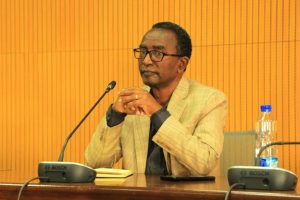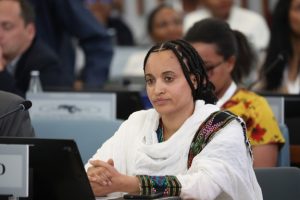
Following the reform wafting across the nation, citizens have started practicing better human and democratic rights. But polarized ethnic politics and citizen politics are permeating the political system all over the nation. Instigating instabilities in some places, the situation is also leading citizens to hate speech on social media.
Thus, related to this new unfolding, scholars are seen giving political analysis on some media, but given the country’s current situation, there is a call for sustainable solution to control problems which occurred during this time. With this in mind The Ethiopian Herald had approached scholars to ask why most of intellectuals come up a troubleshooting or a silver bullet solution? And what more could they contribute? Regarding of this issue, Abebe Assefa Associate Professor on Social Work at AAU told to Herald, scholars could change their students’ mind through teaching them to embrace diversity and to respect it on every situation.
When instability surfaces, they can also support the nation through overt and covert ways. “When we are visible we can influence visibly increasing public’s awareness on the values of unity and peace. And when we are invisible we can influence powerful persons and support them behind, “he stated. Adding, he said, with advocacy and teaching scholars can play their role of warding off possible damages before something wrong unfolds in the community.
And when it occurs, scholars can generate intellectual ideas to control the damage. Coming up with projects will be a way they can help. They have to be a member of them to have a sustainable solution. But sometimes the younger generation is giving ears for activists than scholars. This is also a challenge to be part of the change, he said. Abebe said, most of scholars were ignored by the government on grounds of their previous political and ethnic group.
So, there is a need to teach today’s students to enjoy diversity so as to come up with a better generation and to have a merit-based political system. They should focus on teaching that aims at academic and social skills development of youths to change the system instead of focusing on ethnic identity , he added. But he argued that some scholars are not still certain about their contribution and they fear the political system will hurt them.
And still there are groups that could be coldly greeted by the government. But they want to be part of the reform. He stressed, a scholar means, a person who generates ideas and shows the way out. So, scholars need to support policy makers to have a better solution. They have to teach young students not to be a tool for adult politicians who create instability in the country to fulfill their personal goal. This will support for sustain the nation unity.
Dr. Bekalu Atinafu Research Organizations Director at Kotebe Metropolitan University said on his part that the government system seems posing challenges for scholars to pose their support as needed. Ethnic federalism is observably catalyzing instability. It is this politics that disintegrated Yugoslavian, Russian and others .This system is also a base for some instability here in Ethiopia.
There had been political leaders who do not lend ears to the scholars’ idea. Still, vestiges of similar trends are there. So it is difficult to have willingness, it also challenges for scholars participation, he said. Adding, regarding their number, intellectuals are not participating enough on creating unity and stability in the country because of the system. But some of them have been facing challenges. They have played their role. It is also better to involve more with this situation.
He agreed, the country has no dearth of talented scholars who live here and abroad, but still the government does not hunt for these intellectuals. Hence, the reform is not fully using this powerful human resource. Bekalu concluded, the incumbent has to approach scholars around or outside their political party.
Scholars could give support to the situation without engaging in a political system. With new ideas and researches, they can support to control the problem the country is facing now. But only few persons are engaged in this role given the government’s system is not participatory among other challenges.
The Ethiopian Herald April 21/2019
BY GENET FEKADE




